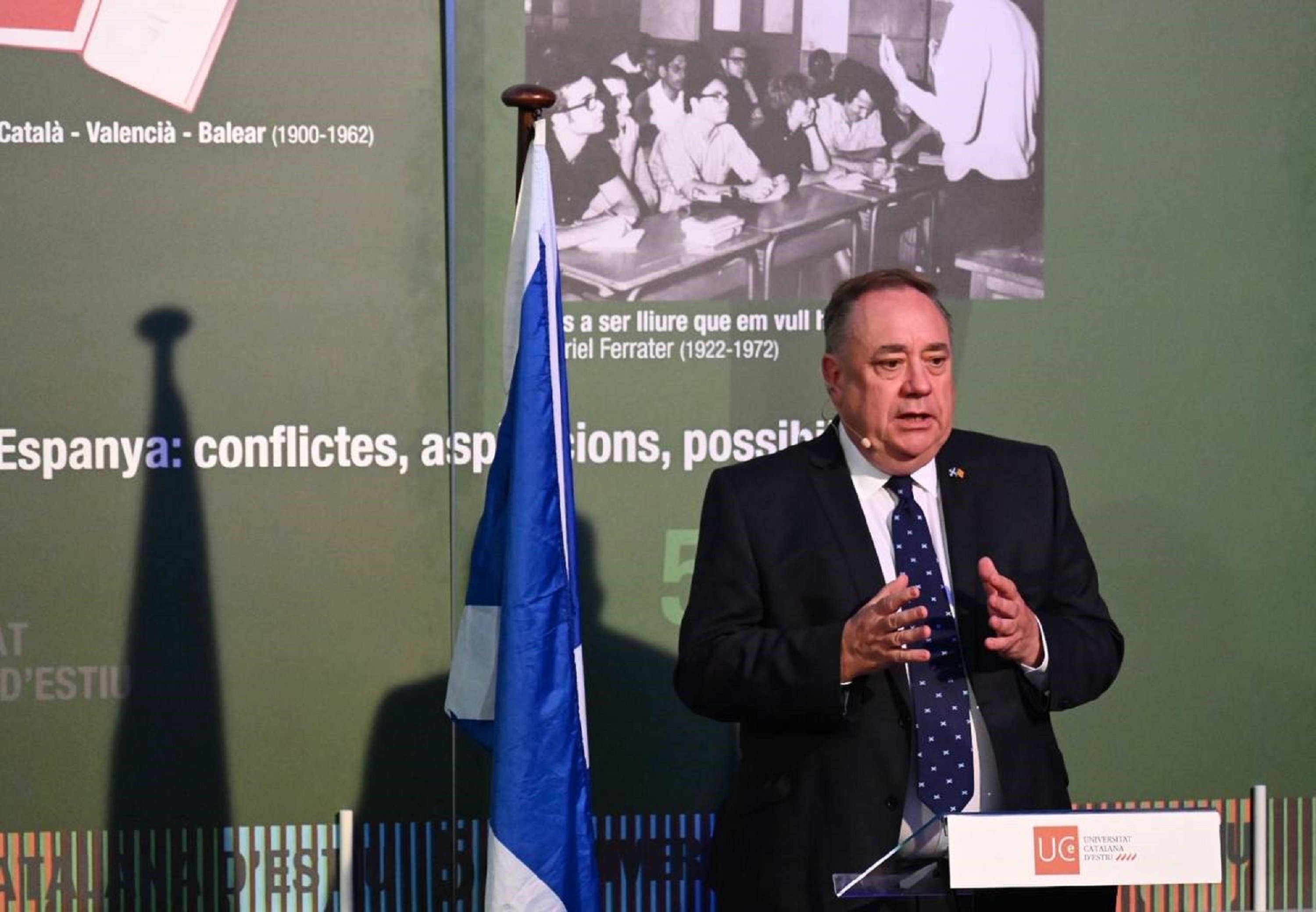Scotland's first minister from 2007 to 2014, Alex Salmond, who led the country to its first independence referendum, has assured that international bodies "will not recognize" Catalonia until "it achieves independence". In an event organized by the Catalan Summer University, in the Northern Catalonia town of Prada, entitled "The Right to Independence", Salmond argued: "International actors do not offer solutions to national movements, they tend to recognize you after obtaining independence". In this regard, he stated that to "achieve independence, the work must be done from within". Regarding the Catalan territorial conflict, he also pointed out that Catalonia is "one of the few nations in Europe whose international rights have not been recognized". "You are a special case," he said.
Video (in English) of Alex Salmond's address to the Catalan Summer University
In his address, Salmond compared the modern struggles of three "stateless nations" for independence - Scotland, Catalonia, and Ireland. Addressing Catalonia as a "special case", he referred to the 1945 appeal made by Catalonia to the incipient United Nations Organization in San Francisco, where he noted how the Catalan representatives made a "ringing declaration": presenting Catalonia very clearly as a nation with a long history, and one that, due to fascist occupation, was not able to be represented at the UN conference. "It was also very clever, because in 1945 it was not clear that war against fascism wouldn't carried on, to unseat Franco." However, said the former Scottish first minister, that despite this "astute political appeal", the Cold War sent global geopolitics in another direction, and nothing happened.
"The EU is guided by realpolitik"
"International bodies don’t offer solutions to national movements. They tend to recognize you after the fact, after independence has been achieved," Alex Salmons concluded. "The heavy lifting to achieve independence has to be done domestically." He explained how he hosted a phone-in programme on UK radio on October 1st 2017, referendum day in Catalonia, in which popular sentiment was overwhelmingly in favour of the Catalan people and against the attacks on voters by the Spanish police. "But almost all the European institutions reacted in the opposite way and the reason is obvious: Spain is a member of the EU, and the EU is guided by realpolitik."
Salmond also contrasted the EU reactions to the cases of Scotland and Ireland after Brexit. Despite the massive vote of Scotland against Brexit, the EU did nothing to intervene on behalf of the Scottish majority will. By contrast, over Northern Ireland, it took action that Salmond thinks may end up culminating Irish independence - through the reunification of the Irish island. And although Salmon admits the Good Friday peace accords played a role in the EU stand, he said the main difference was "the case was being made strongly by another EU member state - the Irish Republic".
Catalonia's "political class failed to follow through"
Thus, "democratic appeals to international authority can be a useful part of the independence process, but they will not provide the answer to Catalan or Scottish ambitions." So, the former Scottish leader asked, enthusiastically quoting Lenin, "what is to be done?" He went through a checklist of the construction of a national movement: building on the foundations of a strong culture; staying on a constitutional peaceful pathway whatever the provocation - noting that Ireland too has been on such a course since the late 1990s; presenting a vision that shows how independence can society change for the better, among other points. But in his final point - leadership - he had special words for Catalonia:
"Leadership needs to provide strategy and circumstances in which success is possible: nothing is worse than raising expectations and failing to carry them through," said Salmond. In Catalonia, he said, the movement has to come to terms with “lack of follow-through by the political class”, the “huge and courageous popular support” shown in 2017 has to find the way to "chart new and successful strategies”.
"Real independence is won on the field of statecraft"
In this regard, of the three nations he was comparing, "Ireland looks best placed, with Sinn Fein in strong positions both in the North and in the Republic." In Scotland, affirms Alex Salmond, despite strong electoral support, "the independence strategy is problematic."
"The UK government has moved to the position of Spain, of not accepting a referendum, instead of being the other way around and Madrid approaching the position of London." For this reason, Salmond has stated that it is necessary to prepare the road map towards independence better than ever: "It is necessary to prepare a vision that justifies independence not only as an act in itself, but for what it will mean for future society, what it will mean for a contribution to humanity in general, how it will change society for the better." On this, he continued: "The right to independence is absolute, but the reality must be fought and won in the field of statecraft."
And the former Scottish first minister also wanted to close by telling his audience in Northern Catalonia that “greater contact among these three - and other - stateless nations is required.”

